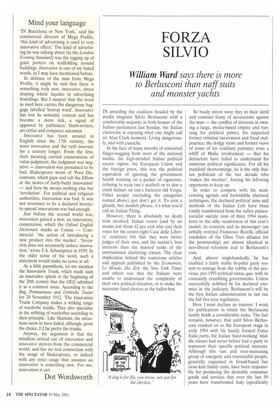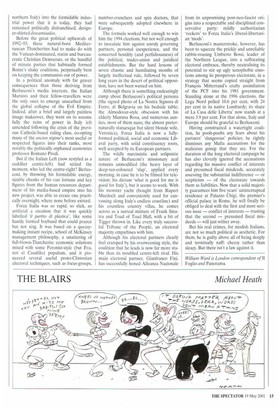FORZA SILVIO
William Ward says there is more
to Berlusconi than naff suits and monster yachts
IN awarding the coalition headed by the media magnate Silvio Berlusconi with a comfortable majority in both houses of the Italian parliament last Sunday, the Italian electorate is enjoying what one might call an Alan Clark moment. Living dangerously, and with panache.
In the face of many months of concerted finger-wagging from most of the national media, the high-minded Italian political ancien regime, the European Union and the foreign press, this was the political equivalent of ignoring the government health warning on a packet of cigarettes, refusing to wear one's seatbelt or to don a crash helmet on one's battered old Vespa. Other people (including the categories named above) just don't get it. To coin a ghastly, but modish phrase, it's what you'd call an Italian Thing.
However, there is absolutely no death wish involved. Italian voters (and by no means just those 42 per cent who cast their votes for the centre-right Casa delle Liberta' coalition) felt that they were better judges of their own, and the nation's, best interests than the massed ranks of the international chattering classes. The clear implication behind the numerous articles and appeals published by the Economist, Le Monde, Die Zeit, the New York Times and others was that the Italians were unable to understand the complexity of their own political situation, or to make the necessary hard choices at the ballot-box.
So busily intent were they in their shrill and constant litany of accusations against the man — the conflict of interests in owning a large, media-based empire and running for political power; his suspected former criminal tax-evasion and fiscal malpractice; the dodgy views and former views of some of his coalition partners; even a whiff of Mafia involvement — that his detractors have failed to understand his immense political significance. For all his manifold shortcomings, he is the only Italian politician of the last decade who 'makes the weather', forcing his left-wing opponents to keep up.
In order to compete with his modernising agenda and formidable electoral techniques, the declared political aims and methods of the Italian Left have been totally transformed from the sullen palaeosocialist suicide note of their 1994 manifesto to the silky suasiveness of this year's model; its contents and its messenger (an artfully restyled Francesco Rutelli, official candidate of the Olive Tree alliance for the premiership) are almost identical in neo-liberal reformist zeal to Berlusconi's own.
And, almost singlehandedly, he has enabled a fairly stable bi-polar party system to emerge from the rubble of the previous, pre-1993 political status quo, with its constantly crumbling governments. Unless successfully nobbled by his declared enemies in the judiciary, Berlusconi's will be the first Italian administration to last out the full five-year legislature.
Here I must declare an interest: I work for publications in which the Berlusconi family holds a considerable stake. The fact remains, however, that until Silvio Berlusconi crashed on to the European stage in early 1994 with his hastily formed Forza Italia party, the Italian 'hard-working' middle classes had never before had a party to represent their specific political interests. Although this vast and ever-increasing group of energetic and resourceful people, generally organised in broad-based but close-knit family units, have been responsible for producing the desirable consumer goods and services that over the last 50 years have transformed Italy (specifically northern Italy) into the formidable industrial power that it is today, they had remained politically disfranchised, designer-shirted descamisados.
Before the great political upheavals of 1992-93, these natural-born Mediterranean Thatche rites had to make do with the Vatican-dominated, statist and bureaucratic Christian Democrats, or the handful of minute parties that habitually formed Rome's shaky coalitions, perpetually bent on keeping the communists out of power.
In a political anomaly with far graver consequences than those deriving from Berlusconi's media interests, the Italian Marxists and their fellow-travellers were the only ones to emerge unscathed from the global collapse of the Evil Empire. Indeed, after a brief and largely painless image makeover, they went on to assume fully the reins of power in Italy left untended following the crisis of the previous Catholic-based ruling class, co-opting many of the ancien regime's most useful or respected figures into their ranks, most notably the politically orphaned economics professor Romano Prodi.
But if the Italian Left (now restyled as a cuddlier centre-left) had seized the moment, who led the centre-right? Berlusconi. by throwing his formidable energy, sizable chunks of his vast fortune and key figures from the human resources department of his media-based empire into his new project, was able to create one practically overnight, where none before existed.
Forza Italia was so rapid, so slick, so artificial a creation that it was quickly labelled 41 partito di plastica', like some hastily formed boyband that could prance but not sing. It was based on a queasymaking instant recipe, school of McKinsey management philosophy, a smattering of full-blown-Thatcherite economic solutions mixed with some Peronist-style (but Eva, not el Caudillo) populism, and it pioneered several useful proto-Clintonian electoral techniques, such as focus-groups, number-crunchers and spin doctors, that were subsequently adopted elsewhere in Europe.
The formula worked well enough to win him the 1994 elections, but not well enough to inoculate him against unruly governing partners, personal inexperience, and the concerted hostility (and perfidiousness) of the political, trades-union and juridical establishments. But the hard lessons of seven chaotic and humiliating months of largely ineffectual rule, followed by seven long years in the desert of political opposition, have not been wasted on him.
Although there is something endearingly camp about Berlusconi's political persona (the signed photo of La Nostra Signora di Ferro, di Belgravia on his bedside table; the Almodovar-style obsession with his elderly Mamma Rosa, and numerous aunties, most of them nuns; the almost preternaturally statuesque but silent blonde wife, Veronica), Forza Italia is now a fullyformed political, social and economic Liberal party, with solid constituency roots, well accepted by its European partners.
The wildly narcissistic and solipsistic nature of Berlusconi's missionary zeal remains unmodified (the heavy layer of deep-tan-coloured 'slap', applied every morning, in case he is to be filmed for television: his dictum 'what is good for me is good for Italy'), but it seems to work. With his monster yacht (bought from Rupert Murdoch and conveniently used for canvassing along Italy's endless coastline) and his countless country villas, he comes across as a surreal mixture of Frank Sinatra and Toad of Toad Hall, with a bit of Tigger thrown in. Like every truly successful Tribune of the People, an electoral majority empathises with him.
Although his electoral partners clearly feel cramped by his overweening style, the coalition that he leads is now far more stable than its troubled centre-left rival. His main electoral partner, Gianfranco Fini, has successfully honed Alleanza Nazionale from its unpromising post-neo-fascist origins into a respectable and disciplined conservative party: mildly authoritarian 'rockers' to Forza Italia's liberal-libertarian 'mods'.
Berlusconi's masterstroke, however, has been to squeeze the prickly and unreliable rabble-rousing Umberto Bossi, leader of the Northern League, into a suffocating electoral embrace, thereby neutralising its potential to stir up ugly xenophobic emotions among its prosperous electorate, in a strategy that seems copied straight from Francois Mitterrand's crafty assimilation of the PCF into his 1981 government. Standing alone at the 1996 elections, the Lega Nord polled 10.6 per cent, with 24 per cent in its native Lombardy; its share of La Casa delle Liberta' now stands at a mere 3.9 per cent. For that alone, Italy and Europe should be grateful to Berlusconi.
Having constructed a watertight coalition, he pooh-poohs any fears about his partners' dangerous' policies; he rightly dismisses any Mafia accusations for the malicious gossip that they are. For the duration of the long electoral campaign he has also cleverly ignored the accusations regarding his massive conflict of interests and presumed fiscal misdeeds, accurately assessing the substantial indifference — or scepticism — of the electorate towards them as liabilities. Now that a solid majority guarantees him five years' uninterrupted residence at Palazzo Chigi, the premier's official palace in Rome, he will finally be obliged to deal with the first and most serious issue — conflict of interests — trusting that the second — presumed fiscal misdeeds — will just wither away.
But his real crimes, for modish Italians, are not so much political as aesthetic. For them, he is guilty above all of being deeply and terminally naff: cheesy rather than sleazy. But there isn't a law against it.
William Ward is London correspondent of Ii Foglio and Panorama



































































 Previous page
Previous page